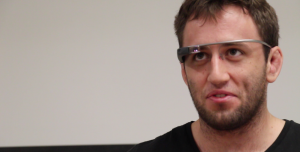Although the Public Speaking courses at North Carolina State University are standardized by requiring the same book and major assignments, instructors are also given a certain amount of room to customize the course to their own teaching style and interests. During my two years of teaching the course, I have worked to integrate digital pedagogy into the classroom through a reflective engagement process with students.
At the beginning of the semester, I ask students to begin thinking about what the future of public speaking will look like, as our own public forum continues to evolve from the original model of the Greek Agora. During the semester, students incorporate digital practices into their traditional speeches: belief/value speeches are performed using Google Glasses as a new presentation style and advocacy speeches are supplemented by displaying backchannel communication via Twitter.
For the final speech, students reflect on the efficacy of our digital experiments and brainstorm their own vision for 21st century public speaking. In the first iteration of this project, students elected to create a Choose-Your-Own-Adventure style series of deliberative videos to be hosted on YouTube, which reflected more closely the way that they actually participate in today’s public forum.
More details below.
Google Glasses

To launch the first use of Google Glasses, I piloted an IRB approved study with a group of two students who volunteered to use the glasses as part of their speeches. The goal was evaluate the glasses for use as a speaking aid, similar to notecards or a teleprompter. Each of the students gave three versions of a speech: 1) one without glasses, 2) one with glasses that are worn but not used, and 3) with glasses that are worn and used. The rest of the students in the class evaluated each of these speeches using our standard rubric in order to determine whether the glasses improve their performance. The study paid particular attention in determining whether the glasses helped improve physical and vocal delivery components such as eye contact and verbal pauses.
This pilot is being expanded to an entire course in order to generate more data.
Choose Your Own Adventure
As part of the Choose Your Own Adventure deliberative speech project, students decided to present these in the innovative Visualization Studio at NCSU’s Hunt Library. The main video was displayed on the front wall of the studio, while supplementary material was displayed on the other two walls in the studio, as pictured above. These featured content spanning the range of graphics, Prezis, Twitter as a form of back channel communication, and the interactive use of polleverywhere.com to help drive audience participation.
An example of one of these Choose Your Own Adventure deliberative speeches can be viewed below:

